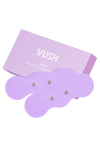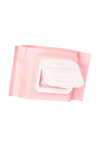
PMS is something we have all heard of before, but may not fully understand.
So, let’s start at the beginning – what does PMS stand for?
PMS refers to premenstrual syndrome. It’s a collection of symptoms related to the menstrual cycle. Naturally, this raises further questions, such as:
- When does PMS start?
- What are the PMS symptoms?
- Are you experiencing PMS or pregnancy symptoms?
- Are there PMS treatments?
At VUSH, we have all the information to answer these questions and can teach you about theactual meaning of PMS.
What are PMS Symptoms?
Let’s begin by answering the question – when does PMS start? Well, PMS symptoms tend to appear just before your period starts. This can be one or two weeks before your period, A.K.A the luteal phase of the menstrual cycle. You can read more about the four phases of the menstrual cycle,here.
There are a bevy of PMS symptoms that an individual can experience, and these are not necessarily the same for everyone. Symptoms range from mild to severe, from PMS depression to an itchy vulva. Some may even feel similar to the symptoms experienced during early pregnancy!
Common PMS symptoms include:
Mood Swings
Perhaps the symptom most often identified with premenstrual syndrome – sudden mood changes. Before your period starts, you may feel teary and anxious, with the occasional crying spell taking hold. Some people experience more severe depression or anxiety, which can be an indication of premenstrual dysphoric disorder (PMDD) or premenstrual exacerbation (PME).
Tender Breasts
Breast swelling and tenderness often occur during the second half of the menstrual cycle. This PMS symptom is usually the most noticeable immediately before your period starts, ranging from mild to severe pain. Some people enjoy the fullness of their pre-period boobs, while others find it too uncomfortable.
Fatigue
Feeling tired and lethargic is something that most people experience during premenstrual syndrome. Trouble sleeping is also a common problem, which adds to the feeling of overall fatigue.
Irritability
Irritability (or high levels of anger) can be a recurring premenstrual syndrome symptom. Connected to changing hormones and chemicals in the body, as well as physical discomfort and fatigue, irritability is a common factor for many struggling with PMS symptoms.
Depression
Experiencing disabling PMS symptoms like depression is a common reality. Fluctuations of serotonin in the brain are believed to play a significant role in PMS depression, with insufficient levels contributing to this symptom, along with difficulty sleeping and overpowering fatigue. Again, it’s important to take this seriously, as it could be a sign of a more severe concern such as PMDD.
Food Cravings
It is not unusual to endure fluctuations in your diet and appetite if you’re experiencing premenstrual syndrome. Whether you start wanting sugary sweets or salty snacks, these PMS food cravings vary from person to person.
PMS vs Pregnancy Symptoms
PMS symptoms can be very similar to the early signs of pregnancy (we know, life with a uterus can be very confusing sometimes). Identifying whether you are experiencing PMS or pregnancy symptoms is crucial to taking the right action to address any discomfort or stress.
Bleeding
Premenstrual syndrome is not typically associated with much bleeding or spotting. Heavy bleeding should begin with your period, which can last anywhere from a few days to a week. For more on periods, click here.
When it comes to pregnancy, light vaginal spotting is an early sign that you’re pregnant. Look out for blood that is pink or brown in colour. This spotting generally happens around two weeks into their pregnancy and can last for a few days.
Nausea
While increased appetite is more indicative of premenstrual syndrome, nausea and digestive discomfort can also occur during PMS. You can try certain supplements (we’ll share more about these later) or other nausea treatments to manage this.
Alternatively, morning sickness is among the first indicators of pregnancy. This nausea and vomiting can occur at any time of the day. Despite being a commonly known sign of pregnancy, not everyone will experience this during their pregnancy.
Stomach Cramps
Stomach cramps are another common symptom of PMS or pregnancy. If you have PMS, cramps may occur roughly 24 to 48 hours before your period and gradually decrease as your period ends.
During early pregnancy, light stomach cramps may occur. They may feel similar to menstrual cramps but will likely be localised in your lower stomach or back. It is possible to have these cramps for weeks, or even months, while pregnant, but if they do not subside, you should talk about it with your healthcare provider.

PMS Treatments
While PMS symptoms can be challenging to live with, there is a light at the end of the tunnel. Various PMS treatments can help individuals manage physical discomfort or emotional struggles. From peaceful meditation to PMS supplements, here are some tools for PMS management:
Exercise
Exercise can be a wonderful outlet and PMS alleviator. Whether it is yoga, walking, or swimming, physical movement helps to promote good overall health and helps PMS symptoms subside. It has been suggested that exercise helps make individuals more aware of physical and emotional stresses so that they can cope better.
Warm Bath
A warm bath can help to soothe a variety of PMS symptoms because of its calming properties. We suggest choosing a time you can be left uninterrupted and introducing other elements such as scented candles, soothing music or essential oils to enhance the experience.
Meditation
Research has shown that meditative practices can help to reduce anxiety, depression and even pain. It’s definitely a worthwhile PMS treatment to try. There are plenty of meditation and mindfulness videos on YouTube to explore, otherwise we suggest downloading a free meditation app to help you get started.
Aromatherapy
Aromatherapy has proven to be a beneficial PMS treatment, addressing issues such as poor sleep and pain relief. Try using diluted essential oils in a warm bath or putting them in your diffusers. We suggest scents like lavender, rose, clary sage, ginger, geranium, eucalyptus, or peppermint.
Vitamins and Mineral Supplements
A balanced diet is key to overall health. When experiencing premenstrual syndrome symptoms, give your body a boost by using PMS supplements alongside your fresh foods. Supplements including calcium, magnesium, Vitamin E and Vitamin B-6 have all been suggested to positively affect PMS symptoms. As with any new supplements or medications, you should check with your healthcare provider before you start.
Hormonal Contraceptives
Traditional PMS treatments include contraceptives, which may help to create a sense of regulated hormone levels and menstrual cycles. This may not be helpful for everyone though, as some people report increased period and PMS symptoms after going on contraception. Always consult your doctor before exploring medication like birth control as treatment.
Sleep
It is impossible to overstate just how important a good night’s sleep is. A lack of sleep leads to further PMS symptoms, such as irritability, fatigue and even depression. Try reducing your caffeine intake and avoid screens before bedtime, opting instead for a relaxing activity such as reading or a warm bath.

Read More on Wellness
If you are interested in learning more about premenstrual syndrome, the stages of the menstrual cycle, the causes of period pain, and much more, check out our VUSH Wellness Blog and explore our collection of articles to answer all your wellness questions. Or, if you have a specific question or comment, contact us today, and one of our VUSH babes will be in touch as soon as possible!









 AUD $
AUD $
Leave a comment (all fields required)